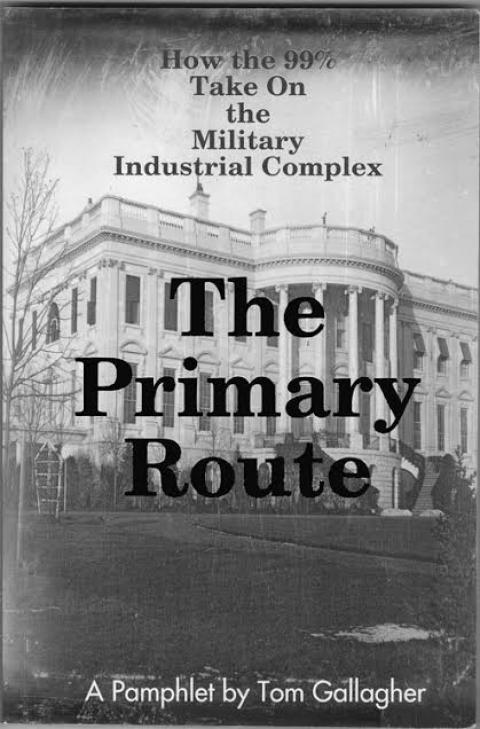The Primary Route: How the 99% Take on the Military Industrial Complex by Tom Gallagher
Tom Paine wrote a pamphlet called “Common Sense” that inspired the American Revolution. Let’s hope that Gallagher’s common sense manifesto will inspire some clear thinking on the American left.
“The Primary Route” is both prescient about the Sanders candidacy and predictive of some of the benefits of that campaign and the reaction of the political establishment.
As a member in the 1970’s of one of the groups that Gallagher characterizes as “the various revolutionary parties structured for operating in a czarist dictatorship” I found Gallagher’s arguments resonating exactly with my own present perspective on the need for a viable American political strategy. We have all grown up a little, but fortunately maintained our desire for global change.
This is an easy read, 187 pages with great photos and tons of wry humor. Gallagher shrewdly puts the prologue in the back so that his own personal political history doesn’t prejudice you against his argument. “He supported who for President..;;???!!!” There is no peeking, please start from page 1. The subtitle of Chapter 1 is “To be or not to be? The American Left’s Hamlet complex.” The first sentence clearly states the thesis of the pamphlet: “This book is all about a simple argument that a group of people that I’m rather generically calling the American left absolutely has to figure out how to work its way into presidential politics if it is to be taken seriously” I couldn’t agree more, and Gallagher lays out the primary route, the Democratic primary as a way for the Left to be active in the biggest most spotlighted arena of American politics.
Gallagher argues that the “primary route” is an additive rather than a subtractive process: participation in the primary adds to the power of the Left and does not subtract its power electorally as a third party effort potentially does in helping to elect a candidate further from the interests of the supporters of the third party. In making his argument he details the history of third parties back to the 1800’s and tells us the story of the origins of the modern primary system, ironically in the year 1912 when the Socialist Eugene Debs got over 6% of the vote. He tells us the recent history of an independent Green Party effort by Ralph Nader and the Democratic primary efforts by Jesse Jackson and Dennis Kucinich. He even mentions the forgotten entrant in the 1992 primaries, the Mayor of Irvine California, Larry Agran. I remember Larry because I negotiated two labor agreements for the public employees of Irvine in the 80’s and because Larry was dramatically arrested for showing up at the Democratic primary debate that had excluded him.
There is a fascinating chapter that compares our electoral system to other countries in the world where third parties have been more viable, notably Germany. Here is the history of the Greens die Grünen and the Left party, Der Linke. I asked the author for permission to use unpublished chapters with my friends and comrades in the left to encourage them to engage in the Democratic primaries so that there would be a challenge to the corporate candidate, Hillary Clinton. Gallagher said wait for the book as he was seeking a publisher. No publisher ever picked up the book and by the time the book emerged, Bernie Sanders had announced.
Gallagher is almost prophetic. Over and over again his advice and analysis presages phenomena we are witnessing now because of the “Feel the Bern” candidacy. Post October 13 debate we were told by the NYT and other pundit paper and media outlets of the status quo that Hillary won the debate even though polls and focus groups resoundingly supported Bernie. Here is Gallagher: “On the conceptual level, the argument will be made that the more intense the ideological gauntlet we force the presidential candidate to run in the nominating process, the more we threaten the vitality of the ultimate nominees in the final election. Implicit in this is the argument that we will be better off simply accepting the candidates that recognized “opinion leaders” present us with.”
The question about Bernie and any primary route challenges is what is left behind? How do we build on the excitement and momentum and grow it and sustain it? Here is Gallagher on “Beyond”: “Eventually we could imagine or at least hope, that if presidential candidates of the left were ever to become a routine and expected thing, the ad hoc, self-selecting aspect of the current nominating process might come to be seen as insufficiently democratic. We might envision a desire for something of a more participatory candidate selection process down the road, perhaps some form of organization that could maintain a measure of continuity from one presidential cycle to the next.” Gallagher does not preclude action on the local state and regional level, he just suggests and the Sanders campaign confirms the importance of entering the big tent and putting socialist ideas on the front burner.
The Primary Rout is a pamphlet that Antonio Gramsci would have been proud of, a simple articulate and humorous discourse that challenges status quo and “common sense” (usually ultra left) thinking on the American left.
Peter Olney is retired Organizing Director of the ILWU. He has been a labor organizer for 40 years in Massachusetts and California. He has worked for multiple unions before landing at the ILWU in 1997. For three years he was the Associate Director of the Institute for Labor and Employment at the University of California.


Spread the word